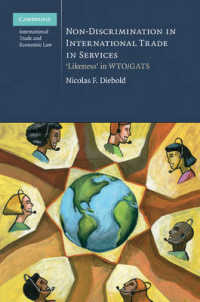- ホーム
- > 洋書
- > 英文書
- > History / World
Full Description
Like every authoritarian regime in history, Nazi Germany tried to inhibit ideological freedom through book censorship. Between 1933 and 1945, Hitler's party orchestrated a massive campaign to take control of all forms of communication in the nation. Although Nazi propaganda has been widely studied, modern historians have decidedly neglected book censorship. In this book, noted scholar Guenter Lewy offers the first comprehensive analysis in English language of the ways in which the Nazis exerted control over the creation, publication, and distribution of books by authors, publishers, bookstores, and libraries.
While Goebbels' Propaganda Ministry played a leading role, other entities engaged in censorship, including the Ministry of Science, Education and Popular Culture, Rosenberg's Office for the Advancement of German Literature, and Bouhler's Party Commission for the Protection of National Socialist Literature. The Gestapo and the Security Service were also involved in the process of enforcement. All of these organizations often acted on their own initiative both on the state and on the local level. As a result of these overlapping jurisdictions, the process of control was disorderly. This illustrates once again that the Third Reich was monolithic in theory but polycratic in practice.
This book explores not only how the Nazis implemented book censorship, but also the ways in which this process affected German intellectuals. It deals with the controversial issue of the so-called "inner immigrants" -- authors who were opposed to National Socialism but chose to remain in Germany and concealed the true meaning of their writings by way of allegories or parables, such as Gottfried Benn, Gerhart Hauptmann, Ernst Jünger, Jochen Klepper, and Ernst Wiechert. Describing the fate of writers and publishers who came into conflict with the organs of censorship, Lewy provides a disconcerting and realistic portrait of intellectual life under the Nazi dictatorship.
Contents
1. Introduction
2. The Book-Burning of 1933
Part I. The Agencies of Control
3. The Ministry for Popular Enlightenment and Propaganda
4. The Reich Chamber of Literature
5. Gestapo and SD
6. The Party Commission for the Protection of National Socialist Literature
7. Alfred Rosenberg: Hitler's Plenipotentiary for Ideological Education
Part II. The Practice of Censorship
8. The Reasons for Banning Books
9. Jewish Books
10. The Purge of the Libraries
11. Wartime Censorship
12. The Battle for Turf
Part III. The Impact of Censorship
13. The Inner Emigration
14. Conclusion
Abbreviations and Glossary
Notes
Bibliography
Index








